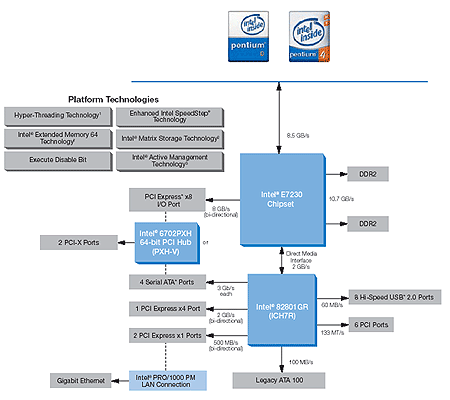The E7230 is intended as an entry-level business server chipset, using
consumer Pentium D and Pentium 4 processors instead of the more expensive
enterprise-class Xeon processor.

The chipset supports 800MHz and 1066MHz system bus speeds using
DDR II memory exclusively. The Northbridge connects to either a PCI Express
x8 I/O interface for high-bandwidth peripherals or an Intel 64-bit PCI hub
connected to two PCI-X slots. video can be provided through the PCI
Express bus.
The E7230 uses the ICH-7R Southbridge chip like all of Intel's
dual-core chipsets, and it receives the same set of features as a result.
the full six extra PCI Express lanes are available, as are four SATA II
ports and the single IDE controller.
nVidia nForce 4 SLI Intel
Edition
While the oldest chipset of the group, the nVidia nForce
4 SLI Intel Edition is also arguably the most advanced, at least in terms of
features. It is the only chipset here to currently feature dual-PCI
Express videocard operation using nVidia's SLI technology, and it also supports
Native Command Queuing through its serial ATA II interfaces.
In other respects, this nVidia chipset is similar to the
Intel chipsets, though it does not feature the RAID 10 support, Memory Pipeline
Technology and additional PCI Express lanes of the 955X Express.
For more details on the nVidia nForce 4 SLI Intel Edition chipset, see PCSTATS
article on the technology right here.
The future
As you might expect, Intel is going to
update the current line of 8xx Pentium D processors at least once. Early next
year we should see the Pentium D 9xx processors released, starting at the
same speed grades as the current line and ramping up to 3.4GHz. The
most notable feature addition will be the move to 2MB of L2 cache for each core,
doubling the amount found in the 8xx processors. This is in line with
Intel's current policy of differentiating subsequent processors releases with
new features, since the company is up against a speed limit with it's Pentium
4 processor architecture. The 9xx processors should be produced on a
smaller 65nm process, freeing up die space for the extra cache memory and
hopefully reducing heat output slightly.
Intel's VT(VanderPool Technology) feature will also
likely be added to the Pentium D 9xx processors. VT allows a single
processor (or core) to run multiple operating systems in different
memory 'containers', making virtual operating systems easier to manage
and support. This is still very much a technology for the future though,
as current virtual PC software does not take advantage of it.
